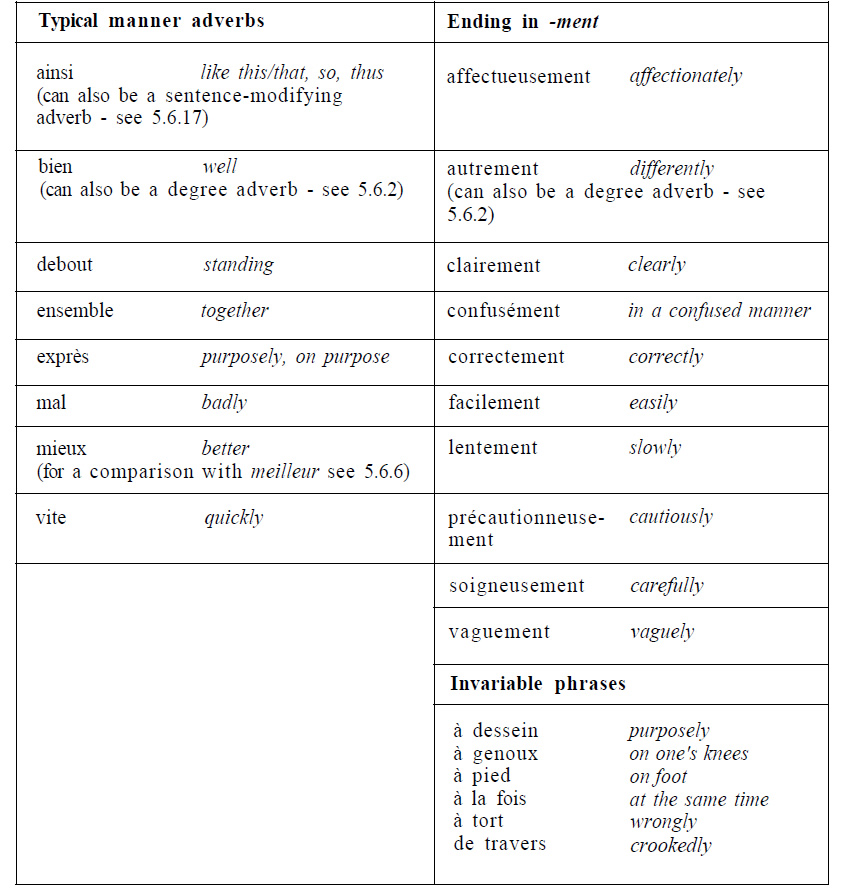Difference between revisions of "Language/French/Grammar/Manner-adverbs"
Jump to navigation
Jump to search
m (Quick edit) |
m (Quick edit) |
||
| Line 53: | Line 53: | ||
===How to form French Adverbs of Manner - YouTube=== | ===How to form French Adverbs of Manner - YouTube=== | ||
<youtube>https://www.youtube.com/watch?v=MM9lusc6IKQ</youtube> | <youtube>https://www.youtube.com/watch?v=MM9lusc6IKQ</youtube> | ||
==Related Lessons== | |||
* [[Language/French/Grammar/Nouns-which-refer-both-to-males-and-to-females|Nouns which refer both to males and to females]] | |||
* [[Language/French/Grammar/Use-of-il,-ce,-cela-and-ça-as-impersonal-pronouns|Use of il, ce, cela and ça as impersonal pronouns]] | |||
* [[Language/French/Grammar/Directly-transitive-verbs-take-the-auxiliary-“avoir”|Directly transitive verbs take the auxiliary “avoir”]] | |||
* [[Language/French/Grammar/Ordinal-numbers|Ordinal numbers]] | |||
* [[Language/French/Grammar/Function-of-adverbs|Function of adverbs]] | |||
* [[Language/French/Grammar/Easy-way-of-generating-the-simple-past|Easy way of generating the simple past]] | |||
* [[Language/French/Grammar/Choice-of-some-time-adverbs-relative-to-the-moment-of-speaking|Choice of some time adverbs relative to the moment of speaking]] | |||
* [[Language/French/Grammar/Pronominal-verbs-and-body-parts|Pronominal verbs and body parts]] | |||
* [[Language/French/Grammar/Position-of-object-pronouns-with-imperatives|Position of object pronouns with imperatives]] | |||
* [[Language/French/Grammar/Negation|Negation]] | |||
* [[Language/French/Grammar/Adjectives-modified-by-adverbs-and-prepositional-phrases|Adjectives modified by adverbs and prepositional phrases]] | |||
* [[Language/French/Grammar/“être”-and-“avoir”-with-verbs-used-intransitively-and-transitively|“être” and “avoir” with verbs used intransitively and transitively]] | |||
* [[Language/French/Grammar/Subject-verb-agreement|Subject verb agreement]] | |||
* [[Language/French/Grammar/Often-Mistaken-Gender-of-Nouns|Often Mistaken Gender of Nouns]] | |||
* [[Language/French/Grammar/Conjugation-group-3-—-verbs-with-infinitives-which-end-in-—re|Conjugation group 3 — verbs with infinitives which end in —re]] | |||
Revision as of 13:04, 26 February 2023
Manner adverbs
Adverbs which describe the manner in which something is done are manner adverbs:
- Je dors bien
I sleep well
- Les choses tournent mal
Things are turning out badly
TABLE: Typical manner adverbs
Examples
Representative examples:
- Il s'est toujours comporté ainsi
He always behaved like that
- Tu chantes bien
You sing well
- Mets-toi debout
Stand up
- Il a mal lu l'étiquette
He misread the label
- Hier soir ça n'allait guère mieux
It was hardly any better yesterday evening
- Je l'oublierai très facilement
I'll forget it very easily
- Elle étendait soigneusement son tailleur
She carefully laid out her suit
Video: How to form French Adverbs of Manner
Videos
French Lesson 99 - Adverbs of manner - YouTube
How to form French Adverbs of Manner - YouTube
Related Lessons
- Nouns which refer both to males and to females
- Use of il, ce, cela and ça as impersonal pronouns
- Directly transitive verbs take the auxiliary “avoir”
- Ordinal numbers
- Function of adverbs
- Easy way of generating the simple past
- Choice of some time adverbs relative to the moment of speaking
- Pronominal verbs and body parts
- Position of object pronouns with imperatives
- Negation
- Adjectives modified by adverbs and prepositional phrases
- “être” and “avoir” with verbs used intransitively and transitively
- Subject verb agreement
- Often Mistaken Gender of Nouns
- Conjugation group 3 — verbs with infinitives which end in —re

